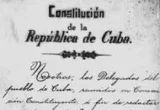 Cuban feminists had actively campaigned for the right to vote since the first days of the Republic. By the early 1920s, universal suffrage had become the unifying flagship issue among a full spectrum of social and political positions held by Cuban women’s associations throughout the island nation. This activism linked women to the political crisis and upheaval that culminated with the short-lived Revolution of 1933, during which President Ramón Grau San Martín announced (Decree 13 of 2 January 1934) that Cuban women would go to polls to elect the members of a constituent assembly. While Grau’s fall only two weeks later brought to a halt the revolutionary program, transitional governments immediately sought to claim its modernizing agenda, universal suffrage among them. Changes were incorporated in subsequent revisions to the Electoral Code, and Article 2 of the Constitution of 1940, which guaranteed equal rights.
Cuban feminists had actively campaigned for the right to vote since the first days of the Republic. By the early 1920s, universal suffrage had become the unifying flagship issue among a full spectrum of social and political positions held by Cuban women’s associations throughout the island nation. This activism linked women to the political crisis and upheaval that culminated with the short-lived Revolution of 1933, during which President Ramón Grau San Martín announced (Decree 13 of 2 January 1934) that Cuban women would go to polls to elect the members of a constituent assembly. While Grau’s fall only two weeks later brought to a halt the revolutionary program, transitional governments immediately sought to claim its modernizing agenda, universal suffrage among them. Changes were incorporated in subsequent revisions to the Electoral Code, and Article 2 of the Constitution of 1940, which guaranteed equal rights.
Provisional President Carlos Mendieta approved Article 38 on 3 February 1934 granting Cuban women the right to vote as a part of a conciliatory package that sought to reduce the wide-ranging storm that characterized Grau’s revolutionary government. Ultimately, the history of women’s rights in Cuba stands out as a microcosm of Cuban social movements throughout the first decades of the twentieth century, an active component of a much-broader social, political, and revolutionary agenda.








